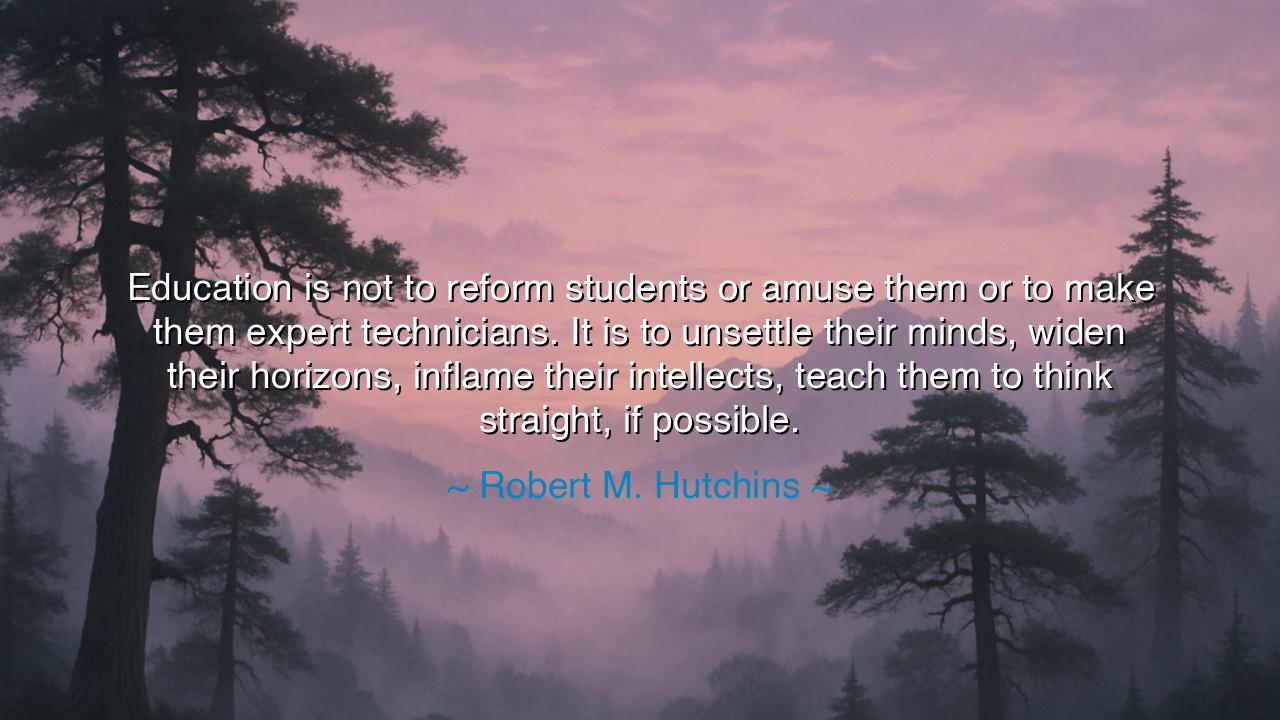
Education is not to reform students or amuse them or to make them
Education is not to reform students or amuse them or to make them expert technicians. It is to unsettle their minds, widen their horizons, inflame their intellects, teach them to think straight, if possible.






Hear, O children of learning, the fierce and fiery words of Robert M. Hutchins, philosopher of the academy and guardian of truth: “Education is not to reform students or amuse them or to make them expert technicians. It is to unsettle their minds, widen their horizons, inflame their intellects, teach them to think straight, if possible.” This is no gentle definition, but a call to arms for the mind. He speaks against the shallow idea that schooling exists merely to tame, to entertain, or to prepare one for the marketplace. Instead, he proclaims that the true mission of education is to ignite, to challenge, to disturb, to awaken.
What does it mean to unsettle the mind? It is to break the chains of complacency, to tear down the walls of comfort, to confront the student with questions that burn. For the soul at rest may remain ignorant, content in illusions, blind to greater truths. But the soul unsettled begins to search, begins to wrestle, begins to grow. Hutchins knew that a mind at ease learns little; a mind disturbed by great ideas, by contradictions, by visions of what could be, becomes a mind alive.
He also speaks of widening horizons. The narrow gaze sees only the self, the village, the familiar. But education calls the eyes to lift, to behold other lands, other voices, other times, and other possibilities. The horizon widened becomes the gateway to wisdom, for it reveals the unity of humanity and the vastness of truth. Without such vision, a student becomes a skilled worker but a small soul; with it, they may become not only a servant of their craft but a citizen of the world.
Consider the tale of Socrates, who walked the streets of Athens not to amuse his listeners nor to train them in trades, but to unsettle their minds. He questioned them until they were forced to confront their ignorance, until their souls were stirred to seek true wisdom. Many hated him for it, for he disturbed the peace of their illusions. Yet in this very unsettling lay the birth of philosophy, the foundation of all Western thought. His life and death stand as a monument to Hutchins’ teaching: that the task of education is not to soothe, but to inflame.
Or reflect upon the story of Galileo Galilei, who dared to widen horizons by declaring that the earth moved around the sun. His discovery did not amuse; it unsettled an entire age. His words threatened authorities and shook ancient beliefs, yet they opened the human mind to the vastness of the universe. This is education in its truest form: not training a man to repeat what is known, but pushing him to think straight, even when the world resists.
Hutchins warns also against reducing education to technical training alone. The expert technician may know how to build, but without wisdom, may also know how to destroy. The amusement-seeker may learn in comfort, but will never be prepared for the storms of life. The true task is to inflame the intellect, to sharpen reason, to teach the student not what to think, but how to think. Only then can they face the complexities of life with courage and clarity.
Therefore, O seekers of truth, let this lesson guide you: do not seek comfort in your education. Seek disturbance, seek challenge, seek the unsettling questions that drive you to greater horizons. Read not only what pleases, but what provokes. Listen not only to those who confirm, but to those who oppose. Allow your intellect to be inflamed, and through this fire, you will be forged into strength.
The final word is this: education is not a lullaby but a trumpet. It is not a gentle caress but a sword that cuts through falsehood. As Hutchins declared, its task is to unsettle, to widen, to inflame, and to teach the mind to walk straight upon the crooked road of life. Embrace this truth, and you shall rise not as a mere technician, but as a free and thinking human being, capable of shaping the destiny of yourself and your world.






AAdministratorAdministrator
Welcome, honored guests. Please leave a comment, we will respond soon